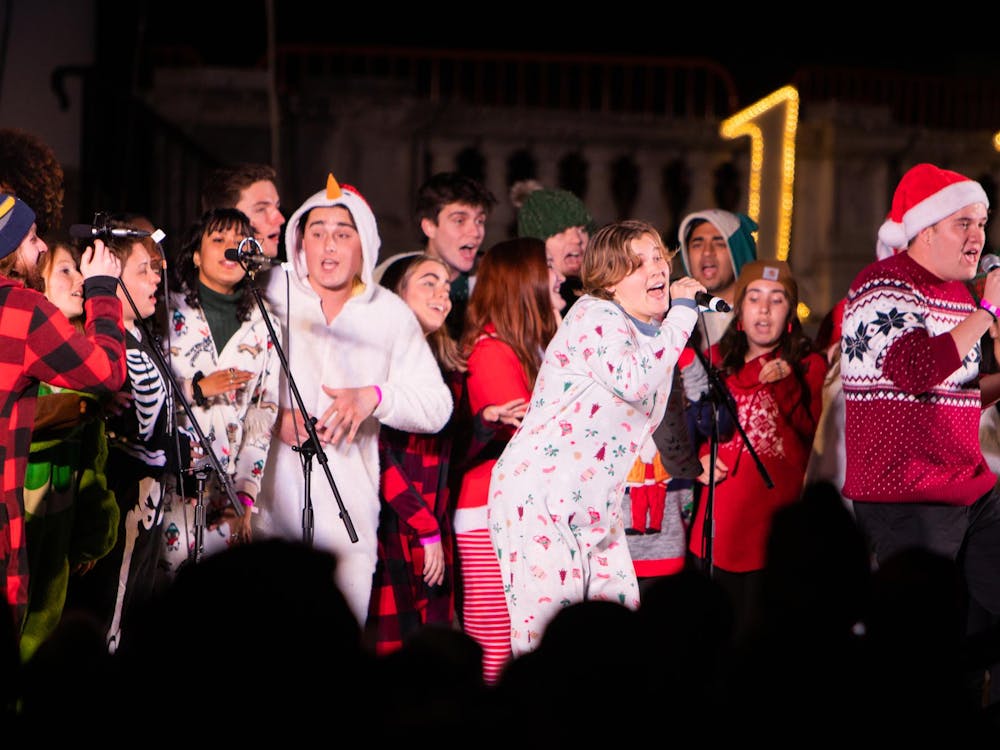Every semester some University students take a break from their college
routines and inhale the sights and
sounds of cultures across the globe.
They trade the Rotunda and Lawn for the Eiffel Tower and the Amazon, but it's much more than landscape that students studying abroad must adjust to when they return to life at the University.
The pictures and postcards that decorate their room walls only hint at the international locales these students enjoyed, but their transformed philosophies show that their experiences were more than skin deep.
Studying foreign affairs became a reality last spring for fourth-year College student Nancy Peterson when she was adopted into the lives of a Ugandan family during her study abroad.
"I was living what I was studying," Peterson said.
For the first two months of her program in Africa, Peterson studied at Makarere University in Kampala with 13 other American students. Taking classes by day and accompanying her host family around the local village by night, she submerged herself into the culture of the third world nation. Nicknamed Naboosa, meaning "female of the sheep clan" by her host family, Peterson said she felt embraced by the entire village.
"They were so happy to have me there, it blew me away," she said. For the last five weeks of her program, she traveled outside Kampala to do research on native people educating their countrymen through creative communication.
Peterson joined a program through World Vision in which local women would dance and perform drama for the locals to educate them about the AIDS virus.
Now situated in her Lawn room, surrounded by fourth years who are living out the University ideal, Peterson smiles when she realizes just months before she lived a very different life.
"I am no longer a novelty," she said. "I am not being scrutinized as much."
Some students also lived in a country that offered a different perspective on work and life - Spain.
Fourth-year College students Katie McCammon and Julie Huffman's study abroad program in Seville included afternoon siestas and soccer games.
They too surrounded themselves into Seville's culture, living with host families and using public transportation to get to their daily classes.
Although McCammon and Huffman had similar academic expectations, their living arrangements differed considerably. Huffman lived in a crowded home with a family of eight, while McCammon shared a house with a single mother and her two children.
McCammon and Huffman, along with 120 other students, mostly American, were prohibited from speaking English at any point. But their semester abroad was not all work and no play.
"Americans live to work, Spaniards work to live," Huffman said. And so, while in Spain, Huffman and McCammon lived as the locals did.
While Huffman and McCammon had a well-rounded experience in Spain, fourth-year English major Sara Murphy had a more academically-intense experience. She spent her semester abroad soaking up literature at Oxford University.
Murphy read and discussed C. S. Lewis' poetry in his homestead and spent her days finding cozy nooks around Oxford, where she could read her six to seven required books a week.
"It's kind of funny because I lived the academical village there," Murphy said.
She exercised a lot of freedom in designing her courses, spending a limited amount of time in class.
"What I loved about it was that I didn't have a daily schedule," she said.
Murphy was able to focus her full attention on academics, but she did find a little time to practice with New College's crew team and mingle with British students.
She said she embraced different means of learning, and realized "it is a beautiful way to live."
While studying abroad enriched the lives of these students, their exposure to foreign cultures challenged their daily approach to the hustle and bustle of University life.
"It's hard to keep everything that happened to me there alive, to let the magic from that experience spill over into my life here," Peterson said. Huffman agreed, saying that the culture she experienced in Spain cannot exist in America.
"Their concept of money, capitalism and time are so different," she said.
Peterson said the difference between Ugandan culture and American culture is not in the amount of work to be done, but rather the priority the work is actually given.
"Sociability was much more important than productivity," she said.
McCammon said the Spanish philosophy about work is similar.
"It was good to be there and know that I didn't have to be productive every minute. It was guiltless," she said. "There is so much focus in America on efficiency, productivity and effectiveness."
Murphy said she plans to use her newfound British focus on academics to shape her last year at the University.
"I'm trying to make this place foster my needs instead of dictate my life," she said.
Some of the students claimed that though their international travel made them appreciate the University, they became less dependent upon it.
"It made me realize there are other places that are just as wonderful," Huffman said. "It also helped me know that I will be okay when I leave this place."
But while these fourth years enjoy their last year at the University, they said they hope others can learn from their new understanding of life, passion and people.
"Don't always assume the American way is the best way," Huffman said.
Peterson said she encourages University students to seize every opportunity at hand.
"We have access to so much. I am constantly reminded that now is the time," she said.
The students said they hope other University students seize the opportunity to embrace a foreign culture through a study abroad program.
"Studying abroad is for a lot more than the 20 percent of students that actually do it," Murphy said.




